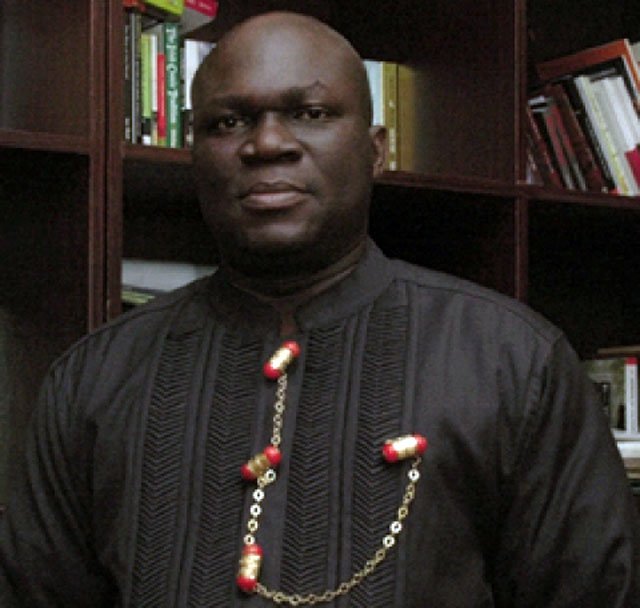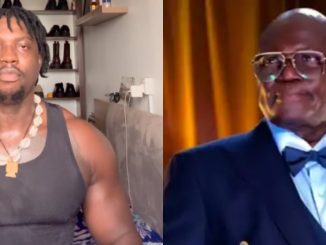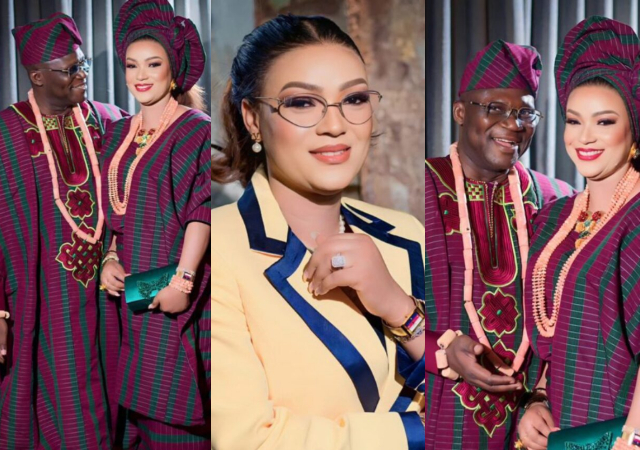 What Exactly Is Babangida Saying? By Reuben Abati
What Exactly Is Babangida Saying? By Reuben Abati
Read Abati’s piece below…
The drama, the controversy, the confusion, the double entendre, attended by seeming cowardice, that grew around a statement, perhaps the statements, purportedly issued by former military President Ibrahim Babangida on Sunday, February 4, is absolutely unnecessary, unfortunate and utterly avoidable. A statesman, the new role in which President Babangida has since found himself, is a father of the nation –more or less, that is; the statesman’s role in the retirement corridors of power is to speak truth to power, as a guide, as a conscience of the nation, as role model and as a highly-placed influencer. Being a statesman thus comes with responsibilities – the responsibility to speak with clarity and conviction is one of these. With the confusion over what President Babangida said or did not say about the state of the nation and the state of health of our democracy, it is now obvious that he still has a lot to learn, despite his experience and stature.
Coming after the impactful and unambiguous intervention by the Ota farmer, former President Olusegun Obasanjo, calling for a change of direction and a reaffirmation of people power in Nigerian politics, Babangida’s follow-up intervention, which could have strengthened an emerging symphony of public thought, has now ended up as mere spittle. Babangida must take responsibility for what clearly comes across to me, as a lack of coherence and organization in the management of his office after office. Statesmen should not speak with both sides of the mouth. They should not play games with their views. They must not toy with public emotions. I don’t know what to make right now, of what Babangida said or didn’t say about our country and our nation. I am sure there are many others who are just as bewildered, and who feel short-changed and are asking: What exactly is Babangida saying?
On Sunday, February 4, when the news hit the airwaves that President Babangida had also issued a statement on the state of the nation under President Muhammadu Buhari, there was a buzz, a wave of excitement across the country. People kept asking: after Babangida, who else is going to stand up and speak? Will T. Y. Danjuma say something too? When are we going to hear from Abdusalami Abubakar, the peace-maker? And when will the prayer warrior-statesman, Yakubu Gowon, also say something to Nigerians? Shehu Shagari. Ernest Shonekan. Nigerians believe that there is a special category of Nigerians, better known as “Owners of Nigeria”, who at every point determine the country’s fortunes or direction.
It is an elite, bourgeois class of decision-makers whose privileges and influence are considered primary and even superior to democracy. It is strange that a people would admit this to be given and inevitable, under a democratic dispensation, but the truth is that Africans even when they claim to be democratic, nurse in their subconscious a primordial subservience to the potency of divine or stolen privileges and status. The subsistence and sustainability of this mentality poses a great threat to the democratic process in Africa. So, when Babangida issued a statement, it was as if another god had spoken. Babangida was labelled the “Prince of the Niger” by his biographers. The Prince spoke on Sunday, February 4, and all the newsrooms jumped into action. Whatever he said should ordinarily be of interest to the public. It would sell the newspapers and the websites. More importantly, it will generate public interest and further stimulate public debate. And what did he talk about? He talked about the state of the nation- the hottest topic in Nigeria at the moment, on the lips of every one, earlier put together so eloquently by Olusegun Obasanjo.
I was preparing for the February 4 edition of ThisDay Live, a Sunday Talk Show I have been anchoring on Arise News TV, since August 2017 when the statement was released. It sounded like a bombshell. I immediately asked the Executive Editor of ThisDay Live, to restructure our programme content for the day and move Babangida’s statement to the top. Now said to have been authored by or not by Ibrahim Babangida or by his spokesperson, Kassim Afegbua, the now controversial statement to use that famous phrase, “spoke truth to power”. It was a well-calibrated, well-timed statement, which took the content of Obasanjo’s earlier statement several steps further. It made the point that Nigeria is at a crossroads, certainly adrift and that it needed to be rescued by the younger generation – what he called “a digital leadership”, as opposed to “analogue leadership.” This was a brilliant point at a time when Nigerians were asking for a “Not-too-young-to-run”, “third-force”, alternative movement.
This Babangida statement didn’t ask Buhari not to run, I mean not so expressly, but it said we should move beyond the crossroads by voting for leadership that is inclusive, consultative, interactive, accountable, competitive and competent. Whereas Obasanjo was direct, this Babangida statement was full of innuendo and sarcasm. He went a step further by raising issues such as campaign finance, community policing and new paradigms. Like Obasanjo, he stressed the need to rebrand Nigeria and rebrand politics, the power of the vote, and the value of security and inclusivity. This was an explosive, brilliant statement that was reflective of a certain, growing level of consensus in Nigerian politics and society. We discussed the statement on the programme and promised a follow-up.
But we then stepped out of the studio only to hear that President Babangida had disowned this insightful statement. He was misquoted. He didn’t say so. The statement was authored, we learnt, by Kassim Afegbua – Babangida’s spokesman – who had gone to town without his principal’s approval. The confusion threw the newsrooms into disarray. Journalists were even accused of misrepresenting the former military President. In due course, a second statement, presented as personally signed by Babangida hit the airwaves. This second statement was wishy-washy, written in barely readable prose, cowardly in every material particular, and I dare say, a PR disaster. So poor in conception and execution was this second statement that the media refused to withdraw the first statement, instead they chose to talk about the drama, the confusion, the controversy over Babangida’s statement. The confusion became the story. The refutation was downplayed.
No statesman should put himself in that kind of ridiculous situation. When he speaks again, nobody will take him seriously, because they would not know if the voice is Jacob’s or Esau’s. Before dusk, it was further reported that the Inspector-General of Police had declared Kassim Afegbua wanted. Afegbua, I salute his courage, stood his ground by insisting that the first statement by Babangida was authentic and that it had been issued under his imprimatur, and that it represents his true and correct position on the state of the nation. I don’t know what IGP Ibrahim Idris’s problem is. He probably needs a refresher course on how to be an Inspector General of Police.
[irp]
As at the time of this writing, he has not denied that he wants Afegbua arrested. But for what really? – For issuing a statement on behalf of his principal, or for expressing an opinion? If Babangida feels he has been impersonated, or misrepresented, it would be his duty, not that of the police to say so and to press charges or sack Afegbua. If Babangida disowns the statement, Kassim Afegbua can claim ownership and excuse Babangida, since in any case there is nothing in the statement that is of any threat to either public peace or national security. To ask Buhari not to run, or Nigerians not to vote for him is a matter of free expression, not a crime against the state. I’ll return to this anon.
As the drama unfolded, ThisDay newspaper on Monday, February 5, 2018 published a story titled “IBB speaks to THISDAY, affirms statement, says Nigeria needs new breed of leaders”. It is curious that only ThisDay newspaper had such a story. Apparently, it didn’t occur to other media houses to check with Babangida or they had no access to him, or they lacked the capacity to dig beyond the confusion. Nonetheless, the ThisDay story is ineffectual. It doesn’t serve the purpose of the intended damage control. President Babangida’s biographers further described him, in his time, as the Machiavellian Prince of Nigerian politics. His critics labelled him the Maradona.
Years after leaving office, he has had enough time to make up his mind who he wants to be. He cannot oscillate between being the Prince of the Machiavelli and at the same time, the dribbler of the Maradona and still claim to be a statesman. Nigerians are tired of being dribbled.
[irp]
It is therefore for this reason that he owes us a second or third statement, stating clearly, where he stands in the matter of Nigeria at this moment. We are back as Obasanjo forcefully argues, at that other moment in 1999, when it was incorrect to sit on the fence. Without that clarity, it would have been better for Babangida to keep quiet, rather than to open his mouth and cause confusion as to what exactly he is saying.
I modify that. The onus is on President Babangida to choose one out of the two statements that have been issued in his name. It is possible that he has more than one spokesperson, working at cross-purposes or there are persons around him who are busy exploiting the fact of proximity. In this latter group, you would find those I once referred to as the na-my-brother-dey-there-crowd, you can add to that, the na-my-daddy-dey-there, na-my-husband-dey-there, na-my-oga-dey-there crowd who brazenly act on behalf of the man of power, exploiting ethnic and filial connections and insisting on a self-ascribed immunity for wrong-doing. No statesman should allow such confusion around him. When Obasanjo spoke, pamphlets of his full statement were on sale across Nigeria the following morning. Babangida has spoken but the pamphleteers have not produced copies of his statement because nobody is exactly sure of what has been said. Whatever message he is trying to pass across is not clear.
[irp]
I salute Kassim Afegbua once more. His current travail projects the plight of spokespersons, not just in Nigeria but all over the world. The job of a spokesperson is one of the most difficult, if not the most difficult in the corridors of power. Political leaders crave love; they want to be seen to be wise and knowledgeable. But when things go wrong, they don’t hesitate to throw their spokespersons under the bus. Often, they feel persons from their clan or faith, or background can better represent them. However, out of office, a political leader or statesman does not necessarily have to speak through a spokesperson. If he is big enough and his message is big enough, he should be able to speak with his own voice and in his own voice. In this instance, only President Babangida can shed light on the conundrum: Who has spoken? Babangida or Afegbua? But beyond that, the first message remains relevant and it is utterly irresponsible if indeed the police have launched a manhunt on the basis of the expression of an opinion.
This is increasingly a growing trend in this country today. It is unfortunate. It is sad. At the end of a National Security Council meeting the other day, a Federal Minister, who seems to enjoy pooping from the mouth, announced that the security agencies had been instructed to arrest any notable Nigerian who uses the social media in particular for hate speech. Only a court of law can legitimately define what constitutes hate speech. And do ordinary Nigerians have the right to hate speech, a right that may not be available to notable Nigerians? And who determines who qualifies as a notable Nigerian? And now on the basis of a statement on the state of the nation and a little drama around that, the Inspector General of Police, with no denial from him or his agents, 48 hours later, has declared a manhunt. We all have a duty to defend the freedom of speech and the right of every Nigerian to think freely and differ.
[irp]
Curiously, Kassim Afegbua, the same man whose right to work and speak we are defending, has now said the news of the purported manhunt for him is a “cooked up story.” He should make this matter easy by reporting at the nearest police station! His principal will have to take a clear stand and put an end to the dribble. Being a statesman requires the ability to stand by one’s convictions and place national interest above personal interest and personal security. By the same token, we expect more statesmen to speak up. When will Gowon, Shagari, Shonekan, Abdusalami Abubakar, Jonathan and Danjuma speak up? Their silence is not golden in this instance. It amounts to an abdication of responsibility. For a country that has done so much for them, they cannot afford to sit on the fence.
[irp]



